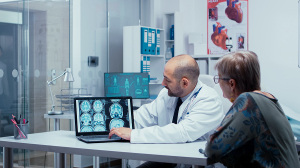by
John R. Fischer, Senior Reporter | November 22, 2021

Researchers in South Korea have created an approach that uses AI to produce CT images based on MR images
Using AI, researchers in South Korea have developed a technique that generates CT images based on MR. Their findings indicate that using MR alone can help in detecting lesions within the skull, which can then be treated with transcranial focused ultrasound.
Additionally the researchers show that obtaining cranial information from MR can be done without special coils that are usually required but not widely available. They also proved that as an alternative, obtaining CT images via AI has clinical utility, a topic of debate in the global radiology community.
‘Patients can receive focused ultrasound treatment without being worried about radiation exposure, and as the additional imaging and alignment processes can be omitted, this will reduce the staff's workload, leading to a reduction in time and economic costs,” said Dr. Hyungmin Kim of the Bionics Research Center at the Korea Institute of Science and Technology (KIST) in a statement.



Ad Statistics
Times Displayed: 45451
Times Visited: 1358 MIT labs, experts in Multi-Vendor component level repair of: MRI Coils, RF amplifiers, Gradient Amplifiers Contrast Media Injectors. System repairs, sub-assembly repairs, component level repairs, refurbish/calibrate. info@mitlabsusa.com/+1 (305) 470-8013
Kim and his colleagues developed a 3D conditional adversarial generative network capable of learning the nonlinear CT transformation process from T1-weighted MR images. They also devised a loss function to reduce pixel variation error in CT images and optimized neural network performance by comparing changes in quality of synthetic CT images with the normalization methods of MR image signals.
Skull density ratio and skull thickness showed >0.90 correlation with the actual CT, and no statistically significant difference. Simulated ultrasound was then performed and had an error of less than 1 mm. Intracranial peak acoustic pressure had an error of approximately 3.1% and the focal volume similarity was approximately 83%. These results show that the transcranial focused ultrasound treatment system can be performed with just the MR image.
The approach is expected to be beneficial for pediatric and pregnant patients, says Kim. "Through follow-up studies on identifying the error associated with the ultrasound parameters and transducers, and understanding the possibility of artificial intelligence CT application in various parts of the body, we plan to continue developing the technology for its applicability in various treatment technologies."
This study was conducted as a creative convergence research project of the National Science and Technology Research Association with the support of the Ministry of Science and ICT (Minister Hye Suk Lim).
The findings were published in
IEEE Journal of Biomedical and Health Informatics.
Back to HCB News

